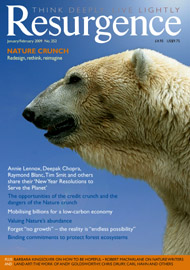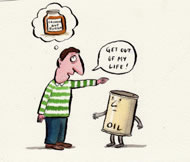CONSIDERING THAT we have always known oil to be a finite resource, it is difficult to understand why we have built an entire infrastructure around it. Take a look around you: almost everything you can see has oil embodied in it somehow, from clothing to household gadgetry, from the pesticides and fertilisers that go into most of the world’s food production to the packaging required for its global distribution, not to mention the producer, commuter and consumer miles involved throughout the process. Even the manufacture of solar panels and wind turbines depends on it. Humanity, it seems, is addicted to oil.
So if oil supplies ran out tomorrow, how would someone living in a city survive? What would we eat? What crops would we need to cultivate if we could no longer buy them cheaply from other countries? How would we keep ourselves warm? Where would our clothes come from? How would we travel and have fun? Would we even have enough clean water to drink?
Feeling that it was quite important to find out, I resolved to go ‘cold turkey’ and make my life a Transition Experiment. Inspired by the Transition Towns initiative set up by Rob Hopkins, a movement which helps communities evolve from the modern consumerist scenario to the post-peak-oil world that is silently approaching, I decided to investigate how far along the personal Transition path it’s possible to walk.
Hopkins brilliantly maps out these paths to post-peak-oil paradise, through Energy Descent Action Plans, amongst other strategies. These outline practical ways in which towns can reduce carbon emissions and dependence on fossil fuels and become more self-reliant in areas such as food, energy, health care and economics.
In 2006, Totnes in South Devon became the first Transition Town in the UK, and the model is now spreading to neighbourhoods across the world. Transition is a journey that challenges us to live more respectfully with Gaia and to build more resilient, diversely skilled communities that experience rapid growth in what I call GLH (Gross Local Happiness). The message is that, by beginning the transition today, we hold the key to a future without oil.
AS I BEGAN to wonder what the scale of my experiment might be, I decided that its foundations should involve me eating only organic, vegan, locally grown and foraged food, with no plastic or non-reusable packaging. I am not allowing myself to buy anything that hasn’t been made and sourced by local, independent craftspeople and traders, and, prompted by John Seymour’s quote, “If a society has a bin, it’s failing,” I have also sent my last item to landfill – the bin itself. Birds don’t have one, so why should I?
There will also be no cars, no flights and no oil or gas heating (although I’m stopping short of going completely off-grid – at least initially, anyway). The setting for my experiment is urban Britain, as I believe that, whatever the solution is, it must be possible for the masses to follow.
When I decided to take the challenge, I thought, “This can’t be so hard,” as I was doing some of it already. But the further down the rabbit hole of truly ecological living I dive, the more I realise how ubiquitous oil actually is. Can I really survive a city lifestyle with no toothpaste, no quick sandwich on the way to a meeting, no detergent, no non-UK synthetic footwear, no TV, no quick pint down the local, no washing machine, and almost no first-hand clothing? Worst of all is the thought of no cashew-nut butter! But the upside is that, given the sharp and ever-increasing rise in the price of imported foods, it should become pretty economical.
I am also intrigued to see what effect the experiment will have on me physically, emotionally, mentally, spiritually and socially. I will be looking at both my energy and Gross Local Happiness levels and will be observing, as time progresses, how it alters my habits and my ability to meet up and have fun with friends and loved ones. The experiment will also test the wisdom of spiritual traditions that say, rather than a burden, discipline is meant to liberate and not constrain the soul.
But to be honest, I have no idea how far down the path I will go. Like everyone else, I’m just feeling around in the dark, trying to find the answers to something none of us fully understands. What I can promise, though, is that I will go down that rabbit hole as far as I can and give it my best.
So I invite you to join me on this journey. Is this experiment, like our oil-fuelled society, doomed to failure? Or will my heart sing and beat in harmony with the seasons as I discover a newly found awareness and joy for all the gifts that Nature gave us before we coated Her in oil?
If you would like to find out more please email [email protected]








